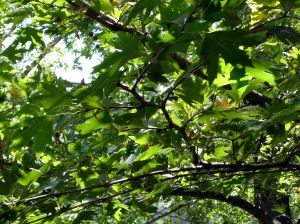
Sycamore, Poplar, Oak; it has taken me weeks to remember their names but I can now. London Plane is the tree I like best with its spiky round brown nuts dangling from its branches; it reminds me where I am and who I am.
Repeat, repeat, repeat. They refuse to understand. But I have no choice. The questions they ask me. I look at their faces and though they think I can’t see; I can. How many times? I can’t count. England; I thought it would be different here, but just like Karachi; always the same look; they don’t believe me.
The first week I was in London, I only went out to the shop to buy milk, dhal, rice and bananas. When I came home, I sat by the window, looking out at the small park, surrounded by tall trees with emerald green grass in the centre and watched the rain and cried; how I cried.
I don’t know why and how that morning, in my second week, I was able to walk out the door and instead of turning left, I went right, and right again into the park. There was no call to pray; just birds singing. Perhaps that helped me. When I got into the park there was no one there. I walked past the trees: strong, thick, brown, red, grey almost black; chopped branches; knotted, chipped, flaking bark; jade green leaves and tiny flowers at their bases: white, yellow, purple. As I looked across I became frightened. Someone was walking towards me. But then I saw it was an English woman with two small dogs, fluffy and white as though they had just had a bath.
‘Good morning,’ she said and before I could open my mouth she and her dogs were gone.
The next morning I wasn’t sure; all I could see were heavy, grey clouds raining down; by seven o’clock I decided it was too late; there would be too many people.
On the third morning the sky reminded me of the bright blue dupattas Razia and I wore at St Joseph’s before Senior Fikree confiscated them. Thinking of those crazy times in Karachi I smiled, as I walked out of the house. When I entered the park it was light but earlier than before so the woman and her dogs hadn’t come yet. There was no one there so I walked slowly round the park looking at the trees, tapping them as though I knew them which I didn’t then. As soon as I saw someone enter the park I walked quickly home.
On my fourth day the singing was joyful, as though the birds were teasing me. That was how I learnt to go out. I kept my head down if there were any men there but I didn’t mind to say good morning to the women.
By my third week I was less frightened and sleeping better. My new friends woke me at six and they welcomed me like the St Patrick’s Cathedral choir.
Every day I see women’s faces: old, young, brown, red, dark, light just like the barks of the trees; English, Chinese, Turkish, African.
One morning a young woman stopped me and said, ‘isn’t this just wonderful.’
I didn’t understand why she stopped me. But it was true for seven days it had been raining.
‘Yes.’
Migratory narrative from women at Heba Oct 2013 www.heba.org.uk